Energy and Water Conservation
With so many units and residents, Boston Housing Authority (BHA) recognizes there are significant energy and water resources consumption. With a yearly $40 million utility bill, BHA is Boston’s largest residential utility consumer - using 90 million kWh of electricity, 10 million therms of natural gas, 250 thousand gallons of oil and 90 million cubic feet of water each year. BHA’s goal is to reduce energy and water consumption (from 2008 levels) by 25% by 2020, consistent with the City of Boston’s Climate Action Plan goals.
While energy and water savings are a critical cornerstone to the Strategic Sustainability Plan, it is equally important to provide energy and water systems that are robust enough to support the long term wellbeing of BHA properties. The goal of conservation must be balanced with the goal of durable, sustainable systems.
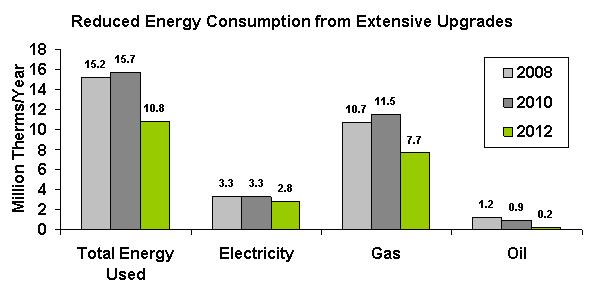
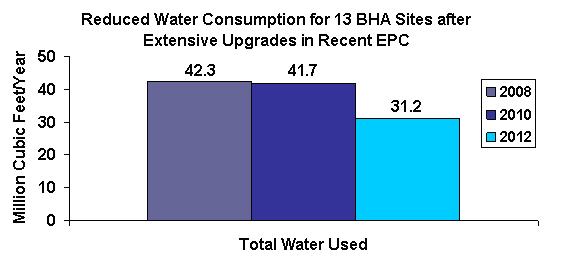
BHA has made important strides in achieving significant energy and water savings through energy performance contracts (EPCs). Under an EPC, private investors provide initial funding for efficiency improvements that will reduce utility costs. The improvements are then paid off through the stream of utility cost savings over time. The US Department of Housing and Urban Development and the Massachusetts Department of Housing and Community Development support these projects by agreeing to set utility reimbursements at a fixed base-line level to accrue savings to pay for the improvements, interest on the loan and future projects. BHA has saved approximately $17 million in utility costs since 2002 through EPCs. The most recent EPC, totaling over $60 million for improvements at thirteen BHA developments, is projected to save over $120 million in utility costs over the next twenty years. It is estimated that approximately $18 million from these savings will be redistributed among the thirteen developments for further upgrades and improvements over the length of the EPC.
Continued utility cost savings are based upon the following measures at selected developments.
- Heating System Upgrades include small-scale measures (installation of temperature controls and Energy Management System) and large-scale measures (decentralization of domestic hot water boilers and boiler replacements, including a conversion to hot water and natural gas in instances where the site currently has a steam and/or oil-fueled boiler).
- Water System Upgrades are uniform throughout each development and include the installation of a low-flow toilet and a low-flow showerhead in every unit.
- Electricity and Lighting Upgrades include exterior lighting controls, exterior security lights, interior common area lights and interior apartment lighting upgrades.
The following graphs illustrate historical data alongside future savings projections resulting from the most recent EPC.


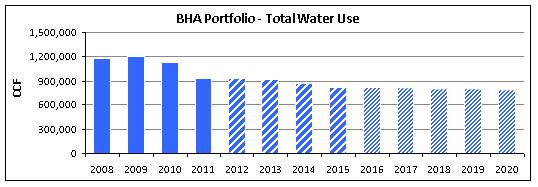
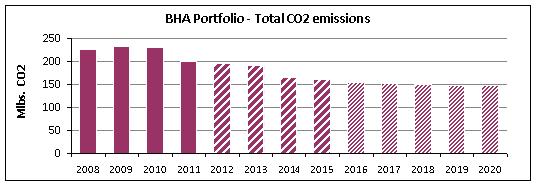
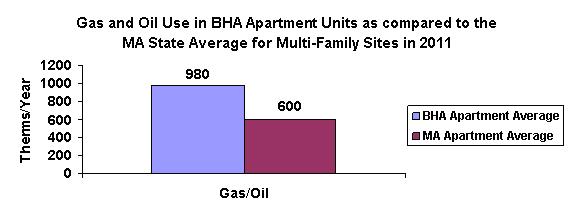
Green Physical Needs Assessment
Over the next year, BHA will implement HUD’s Green Physical Needs Assessment (GPNA). Through this process, BHA will compile a detailed inventory of existing conditions and capital needs, as well as a comprehensive energy audit of all properties. This work will form the basis for decisions about the next set of energy and water savings projects and future EPCs. BHA will also implement a data tracking system to more readily analyze the wealth of utility and cost data the organization currently maintains.
BHA encourages input and feedback from residents when making decision about sustainability upgrades. For example, the exterior light control upgrade was later added to the EPC report after the need was identified by members of the resident committee. Options currently under consideration are resident training programs, information sessions, and systematic feedback on energy consumption.
The overall goals for energy and water conservation are to meet and exceed the City of Boston’s Climate Action Plan and bring BHA properties’ usage level closer to that of other, similar housing units in the state. Continued energy upgrades will bring BHA closer to reaching these energy consumption goals. Resident engagement and behavioral aspects of energy conservation will be a necessary in lowering energy usage.
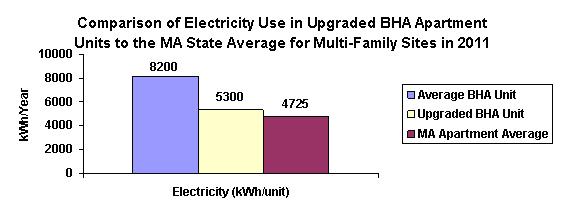
Energy and Water Conservation Goals
- Develop an energy management review procedure for all capital and redevelopment projects.
- Participation in HUD’s Affordable Green Initiative pilot program beginning in 2013 and meet all requirements for Green Organizational Accreditation by 2015.
- Implement the Green Physical Needs Assessment, including a baseline energy audit of all BHA properties in 2014.
- Reduce energy and water consumption from 2008 levels by 25% by 2020.
- BHA will create a set of graphic tools to help communicate to residents
- the amount of energy and water being consumed.
- what energy improvements are happening at their site.
- concrete benefits of incorporating sustainable measures into their daily lives.